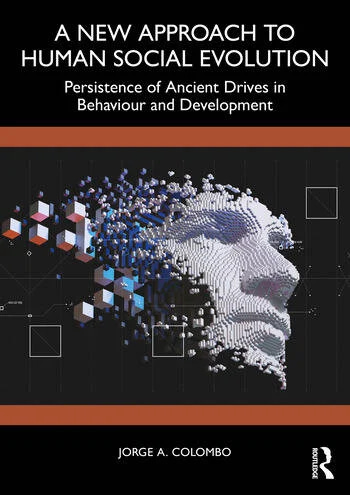
Human societies are built on layers of culture, law, and technology, yet beneath it all, some of the oldest instincts in the animal kingdom continue to shape our world. From political power struggles to economic inequality and environmental exploitation, an evolutionary past rooted in dominance, survival, and competition still drives much of human behavior today.
In A New Approach to Human Social Evolution, neuroscientist and anthropologist Jorge A. Colombo argues that these deeply embedded instincts are at the core of modern crises, from authoritarianism to resource depletion. Unless societies actively work to counteract these primal drives, he warns, inequality, conflict, and environmental destruction will only intensify.
“Ancient survival mechanisms continue to shape human behavior,” Colombo writes. “Without conscious intervention through education and universal values, humanity risks perpetuating cycles of dominance, inequality, and ecological collapse.”
The human brain evolved not in isolation, but through a long struggle for survival. Early hominins were prey before they became predators, and this transition shaped their neurological development. According to Colombo, this shift rewired human cognition, embedding survival mechanisms deep within the brain’s structure.
At its core, the human brain retains an ancient architecture. The basal regions—the parts responsible for basic survival instincts—still govern fundamental behaviors such as territorialism, reproduction, and fight-or-flight responses. Over time, layers of cognitive complexity were added, allowing for abstract thought, creativity, and social cooperation.
Yet these evolutionary advances did not eliminate older instincts; they merely redirected them. The aggression once used to escape predators now plays out in warfare and political struggles. The drive to secure food and territory manifests in economic competition and resource hoarding. Even religion and ideology, Colombo argues, often serve as vehicles for ancient survival behaviors, reinforcing group identity and justifying conflict.
“Fight and flight remain basic behavioral principles,” he writes. “Even when subdued under religious or mystic beliefs, aggressive and defensive behaviors emerge to defend or fight for even the most sophisticated peaceful ideologies.”
Colombo argues that political and economic systems are not just cultural constructs; they are extensions of primal instincts for hierarchy and control. In human societies, dominance is expressed through military force, propaganda, financial control, and social class divisions.
“Dominance exerted through political, economic, social class, or military power creates privileged structures that shape social hierarchies,” he writes.
History provides ample evidence of this dynamic. Empires rise and fall based on territorial expansion and resource acquisition. Religious institutions have often enforced authority through punitive doctrines. Economic systems—whether feudalism, capitalism, or communism—revolve around the struggle for resources and influence.
Modern consumer culture, Colombo suggests, is another expression of this primal drive. Advertising and corporate interests fuel excessive consumption, mirroring the instinct to stockpile resources for survival. Meanwhile, environmental destruction, fueled by industrial expansion and short-term economic gains, reflects a failure to override these ancient impulses.
While evolutionary forces have shaped the human brain, they do not dictate the future. Colombo argues that the key to transcending these ancient drives lies in education and the promotion of universal values.
“Profound cultural changes are only possible and enduring if humans come to grips with their actual primary condition,” he writes.
Education, he suggests, must go beyond academic knowledge and address the psychological and neurological roots of human behavior. Societies must actively counteract inherited biases toward competition and hierarchy, fostering a sense of global responsibility.
Colombo points to artificial intelligence as a test case for this challenge. As AI transforms the economy and workforce, those with access to education and resources will gain even more power, while underprivileged communities risk further marginalization. Without policies designed to close this gap, technological advances will only deepen existing inequalities.
“More communities will become undernourished, impoverished, and without access to primary healthcare or adequate education for the continuous changes in the modern world,” he warns.
The alternative, he argues, is a world where survival instincts dictate global affairs—where dominance, greed, and tribalism continue to drive decision-making at the highest levels.
Colombo’s work challenges the assumption that human progress is inevitable. While science and technology have advanced, the biological and psychological forces that shaped early human societies remain largely unchanged. The question is whether modern humans can recognize these instincts for what they are—and make the conscious decision to rise above them.
Without deliberate intervention, he warns, the same forces that shaped ancient power struggles will continue to dictate the course of history. The choice between a just, sustainable world and one driven by dominance and destruction, he argues, depends on whether humanity can override its most deeply embedded instincts.
“The aggressiveness, cruelties, social inequities, and unrelenting individual and socioeconomic class ambitions are the best evidence that humans must first recognize and assume their fundamental nature to change their ancestral drive,” he writes.
The ability to create a more just and sustainable future, Colombo suggests, may depend not just on technological progress, but on a deeper understanding of the ancient forces still shaping human behavior.
-
Sapolsky, R. M. (2017). Behave: The Biology of Humans at Our Best and Worst. Penguin Random House.
-
Wrangham, R. (2019). The Goodness Paradox: The Strange Relationship Between Virtue and Violence in Human Evolution. Pantheon Books.
-
Harari, Y. N. (2014). Sapiens: A Brief History of Humankind. Harper.








